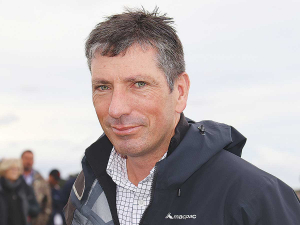Cleland named OSPRI chair
Southland farmer and director Tony Cleland has been named OSPRI New Zealand’s new chair.
 BLNZ's Sam McIvor says rural communities are concerned about the impacts of large-scale conversion of sheep and beef farms into forestry, particularly carbon farming, which undermines these communities.
BLNZ's Sam McIvor says rural communities are concerned about the impacts of large-scale conversion of sheep and beef farms into forestry, particularly carbon farming, which undermines these communities.
New Zealand risks losing increasing areas of good sheep and beef farmland to forestry unless the Government acts to limit carbon offsetting.
That's the message from Beef+Lamb NZ following a study which reveals a significant increase in the amount of farmland sold into forestry, driven in large part by an increase in the carbon price.
The study by BakerAg, commissioned by B+LNZ, shows that in 2017, 3,965 hectares of whole sheep and beef farms were sold into forestry. This increased to 20,227ha in 2018 and to 36,824ha in 2019. While this declined to 16,764ha in 2020 (most likely as a result of Covid-19), B+LNZ thinks this has regathered momentum this year and moved into new regions - threatening rural communities.
"While B+LNZ does see a role for forestry in addressing climate change, we are calling for urgent discussions and government action on mechanisms to ensure that too much does not happen," says BLNZ chief executive Sam McIvor. "They've repeated a mantra of 'right tree, right purpose, right place' but frankly the evidence shows that's not happening - it's threatening rural communities and undermining New Zealand's future economic viability."
B+LNZ's estimate that transitioning productive land to exotic forestry over the last three years has resulted in a reduction of up to 700,000 stock units (or 700,000 sheep) with downstream implications for processing companies and supplying services.
The report also busts myths about trees going on 'unproductive' land and B+LNZ says this reinforces its view that the integration of forestry on farms is a better way of managing our landscapes and meeting climate change targets.
"The amount of land intended to change into forestry on average already exceeds the levels of afforestation by the Climate Change Commission for meeting our Zero Carbon Act targets," McIvor adds.
He says with the Climate Change Commission suggesting the carbon price will rapidly increase, the sector is calling on the Government to work with it, and the forestry sector, on how forestry offsetting can be managed.
"The Climate Change Commission and the Parliamentary Commissioner for the Environment have also both recently suggested the need for policy changes to limit forestry offsetting," McIvor explains.
"Without urgent action, the sale of sheep and beef farms into forestry will only accelerate as the carbon price increases, and fossil fuel emitters will continue to receive a 'get out of jail free' card and not change their behaviour."
The report was unable to identify exactly how much of the sheep and beef farmland sold into forestry was intended for pure carbon farming. However, B+LNZ says, based on examination of the land titles about 26,550ha of the 77,800ha of whole farms sold into forestry since 2017 were to carbon-only entities (about 34% of the whole farm sales).
"This is important to our rural communities who are concerned about the wider impacts of large-scale conversion of beef and sheep farms into forestry, particularly carbon farming, which does not support the same number of regional jobs - in fact, it undermines these communities," McIvor adds.
Not True - Foresters
Forestry interests says the survey is nowhere near robust nor detailed enough for the Government to impose controls over the rate of forest planting.
Forest Owners Association President Phil Taylor says the Beef+Lamb NZ report is a worthy contribution to the land use debate, but it raises more questions than it answers.
“Official figures clearly point to a decline in the area of the exotic plantation forest estate, and so new planting is not keeping pace with the land area going out of forestry.”
He claims the plantation forest estate has shrunk by 162,000 hectares in the past 18 years, mostly to dairy farms. The president of the Farm Forestry Association, Graham West, says farmers should be free to continue to make economic decisions on whether they want to use their own land to plant trees and on what land classes.
West says the report is actually positive about the integrated use of trees on farms and that land sales to forestry are giving better capital gain, which allows movement up the farming ladder or retirement.
Taylor says the report shows that very little is known about the extent of carbon-only forest planting in recent times.
“The Beef+Lamb report estimates this non-harvest forest planting is about 30% of the total planting. But nobody has any real idea at the moment,” he says.
“If this carbon planting is on land which could be productive for timber or livestock – then we would have concerns that the land should be used better.”
The South Island Dairy Event has announced Jessica Findlay as the recipient of the BrightSIDE Scholarship Programme, recognising her commitment to furthering her education and future career in the New Zealand dairy industry.
New Zealand and Chile have signed a new arrangement designed to boost agricultural cooperation and drive sector success.
New DairyNZ research will help farmers mitigate the impacts of heat stress on herds in high-risk regions of the country.
Budou are being picked now in Bridge Pā, the most intense and exciting time of the year for the Greencollar team – and the harvest of the finest eating grapes is weeks earlier than expected.
The Real Estate Institute of New Zealand (REINZ) has released its latest rural property report, providing a detailed view of New Zealand’s rural real estate market for the 12 months ending December 2025.
Rural retailer Farmlands has released it's latest round of half-year results, labeling it as evidence that its five-year strategy is delivering on financial performance and better value for members.